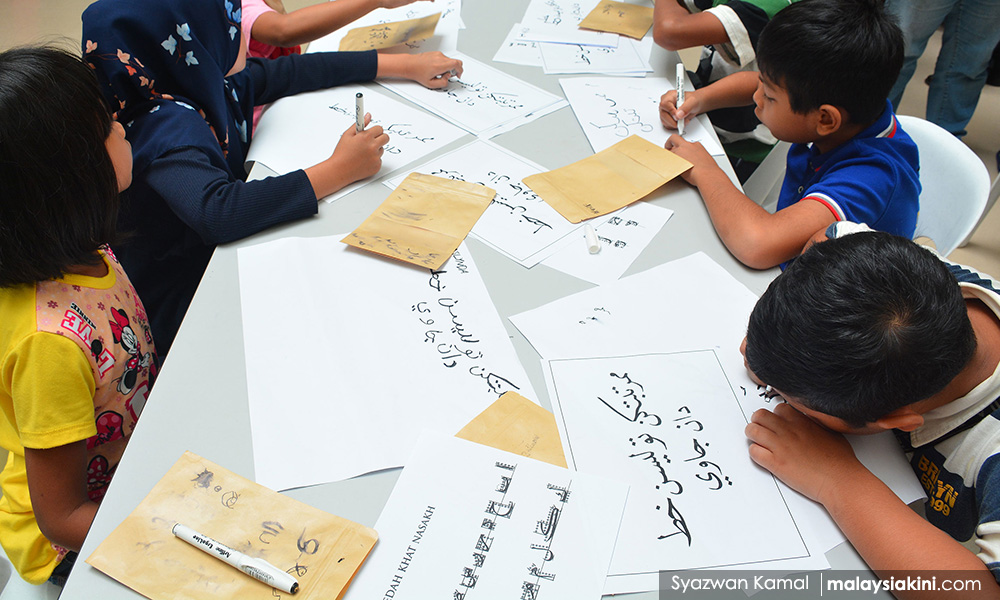COMMENT | At first, I wanted to ignore the piece written by the press secretary to former education minister Maszlee Malik because the rambling article seems to attack me.
But people told me that there were many idiots out there who would take wholesale whatever he wrote. So here goes, a bit long but I can assure you it is worthwhile reading it.
The article aims to call into question as to whether or not my friends and I understand the meaning of education.
Or at least I think that’s what the article is supposed to do. It’s a very confusing article, so let’s try to get to the bottom of what the article is trying to say.
The article starts with apologies and saying that 20 months is too short a time frame for fulfilling the hopes and dreams of the rakyat. Fair enough, although my complaint was never about progress not happening quickly, rather the priorities of the Education Ministry was where I had my doubts.
The author then talks about a book by Paulo Freire Pedagogy of Solidarity. The book discusses the definition of education and its application to daily life as human beings. It’s useful to have a good definition of something before you can discuss it properly - so far so good.
But the article takes strange turns from that point onwards. In reply to his question of “what is education?” the author starts talking about slow Internet speed in rural schools, uncompleted and run-down school laboratories and other infrastructure issues.
What does this have to do with the definition of education?
I don’t remember saying that we do not need to equip our schools properly, so I’m not sure why he’s bringing this up as a rebuttal to my opinions.
My point has always been about getting the basics up to speed - English, Science, Maths. The recent PISA studies shows how far behind our students are in just these absolute basics. And, therein, shows the writers total lack of understanding of the subject – you do not need the Internet to teach basic Science, Maths or English.
Students excel in them 40 years ago even without the help of a calculator. We only had good teachers and the requisite class time – that’s it.
If the point he’s making is that the necessities are not up to par, is that not the ministry’s job to fix? I don’t know about you, but I would have much preferred to hear the education minister talk about large scale initiatives to equip our rural schools, the challenges involved, and how the public can help.

Instead what we get is black shoes, opening up hotel swimming pools, and inserting first khat and later twisted into Jawi into the syllabus. Mind you, these changes happened only in vernacular schools due to the concerns displayed by the organisations in charge of those schools but khat remains in the syllabus in the Sekolah Kebangsaan.
I would also add that we could still improve these basics with the current infrastructure that we have while waiting for the improvements to happen. One of my main points is that we spend way too much time on religious subjects, and if we put those hours into English, Maths, and Science instead, we would see huge improvements in a short time.
What is he proposing here? Is he suggesting that we wait for perfect infrastructure before we can start educating our students with what should be the top priorities?
But let's be clear. I have to insist again that we need to get our priorities right. Please remember dear readers that what our students are lagging are the basics. Not advanced study or specialisations.
Anyone who understands the fundamental of science, which is what we teach at primary and secondary levels, will tell you we do not need Internet infrastructure to teach them. If there were main issues involved it would be:
1.) The time spent on teaching science needs to be drastically increased. A simple enough task to do even with existing resources. An average of 1.5 hours per week for science vs an average of 5.5 hours per week for Agama and Arab-related subjects for primary education makes no sense.
Indoctrination of religion is the priority in Malaysia; not education, and not the teaching of science.
2. You do not need Internet capability at all to teach science. You just need good, passionate teachers. Even without laboratory facilities, basic rigorous science education can be achieved with more hours and more science teachers who are good.

But somehow khat/Jawi needs to be forced upon us now. Here’s a suggestion: if we reduce the amount of hours used to teach religious subjects, we can free up resources and use that money to hire good science teachers and to equip the schools’ basic laboratory facilities, if that is lacking.
Killing two birds with one stone. No need for Internet mumbo jumbo purportedly needed.
Speaking of which, the author asserts that my friends and I are from the “Bangsar Bubble”, and that we suffer tunnel vision due to our privileged stations in life. I will not expound much on this because it’s ad hominem.
The economics are quite simple. The successful people are successful precisely because they have benefited from a good education, and it should not surprise anyone that they are the loudest in extolling the virtues thereof and they recognise the priorities; something the writer and his ex-minister of education had failed to take cognizance of let alone implement.
Also, anyone who’s familiar with my work know that I do. I have been going into the Orang Asli’s kampungs and their schools since I started more than 10 years ago. I have been working very closely with them to support their development and raising the issues they suffered in their schools.
Trust me, that is no Bangsar. I want to share with you all the photos I have taken when I visited Penan kids at Long Singu, Mentalun, Sarawak, five years ago. Also, photos from an Orang Asli school in Pos Musoh, Perak.
The author then goes on about a myriad of different things that again have nothing to do with the question that he put forth. Selective perception, something about "exporting dreams", a parent complaining about ustazah teaching students about alam kubur, and some "feel good" rhetoric about how Maszlee’s administration was all about love, respect, and happiness, and how good teachers are brought into public awareness, among other things.
Allow me, dear reader, to skip all of that and get to the heart of the matter. If the author is not willing to provide an answer to his question, then let me supply one.
Education to me is the process of learning how to think. If a student merely stores information in his brain only to regurgitate it later, that’s memorising. If the student is asked to accept ideas without question because it is divine faith or against his will, that’s indoctrination.
True education must, therefore, be a process whereby any ideas or understanding that the student ends up having is arrived at by using their faculties, with the teacher there as a supportive guide.
It is, therefore, very ironic to me that the author would state “Freire also writes that education ought not to be implemented by force” in one paragraph and a few paragraphs later ridicule a parent’s complaint about ustazah teaching her child about alam kubur. The moment religion is involved, the “no forcing” policy is cast aside.
To me, this whole article is further proof that our education system is not producing graduates that can be competitive in the global market. The article is all over the place.
It starts with a question and never answers its own, opting instead to talk about a whole slew of unrelated tangents, with what must be January 2020’s quota of big words thrown into the mix.
If this is how a staff member of the Education Ministry organises his thoughts, then what exactly is being taught to our students? I shudder to think.
SITI KASIM is a lawyer and activist. This article first appeared on her Facebook page.
The views expressed here are those of the author/contributor and do not necessarily represent the views of Malaysiakini.


